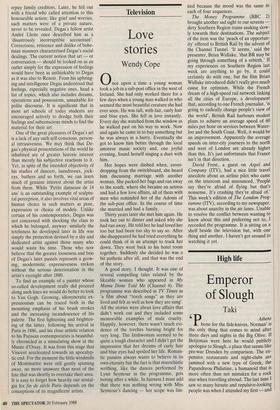Television
Love stories
Wendy Cope
0 nce upon a time a young woman took a job in a sub-post office in the west of Ireland. She had only worked there for a few days when a young man walked in who seemed the most beautiful creature she had ever seen. He was tall, with fair, curly hair and blue eyes. She fell in love instantly. Every day she watched from the window as he walked past on his way to work. Now and again he came in to buy something but he was always in a hurry. Eventually she got to know him better through the local amateur music society and, one joyful evening, found herself singing a duet with him.
Her hopes were dashed when, eaves- dropping from the switchboard, she heard him discussing marriage with another woman. She packed her bags and ran away to the south, where she became an actress and had a few love affairs, all of them with men who reminded her of the Adonis of the sub-post office. In the course of time she married and had a family.
Thirty years later she met him again. He took her out to dinner and asked why she had run away. He told her he had loved her too but had been too shy to say so. After she disappeared he had tried everything he could think of in an attempt to track her down. They went back to his hotel room together. Suddenly she decided he was a bit pathetic after all, and that was the end of the story.
A good story, I thought. It was one of several compelling tales related by the likeable women who appeared in My Mama Done Told Me (Channel 4). The programme was described in TV Times as `a film about "torch songs" as they are lived and felt as well as how they are sung'. All the stories were about love affairs that didn't work out and they included some memorable examples of male cruelty. Happily, however, there wasn't much evi- dence of the torches burning bright for very long. The Irishwoman seemed to be quite a tough character and I didn't get the impression that her dreams of curly hair and blue eyes had spoiled her life. Roman- tic passion always wants to believe in its own eternity but the fact is that masochistic writhing, like the dances performed by Lynn Seymour in the programme, gets boring after a while. In fairness I must add that there was nothing wrong with Miss Seymour's dancing — her scope was lim- ited because the mood was the same in each of four sequences. The Money Programme (BBC 2) brought another sad sight to our screens dirty Southern Region trains snaking slow- ly towards their destinations. The subject of the item was the 'peach of an opportun- ity' offered to British Rail by the advent of the Channel Tunnel. 'It seems,' said the presenter, Brian Widlake, 'that BR may be going through something of a rebirth.' If my experiences on Southern Region last week are anything to go by, it could certainly do with one, but the film Brian Widlake introduced didn't really give much cause for optimism. While the French dream of a high-speed rail network linking all the cities of Europe, a development that, according to one French journalist, 'is going to radically change people's view of the world', British Rail harbours modest plans to achieve an average speed of 60 miles per hour on services between Water- loo and the South Coast. Well, it would be an improvement. Apparently the average speeds on inter-city journeys to the north and west of London are already higher than this. It's just unfortunate that France isn't in that direction.
David Frost, a guest on Aspel and Company (ITV), had a nice little travel anecdote about an airline pilot who came on the intercom and announced, 'People say they're afraid of flying but that's nonsense. It's crashing they're afraid of.' This week's edition of The London Prog- ramme (ITV), according to my newspaper, was about anarchy in the air lanes. Unable to resolve the conflict between wanting to know about this and preferring not to, I recorded the programme. It is sitting on a shelf beside the television but, with one thing and another, I haven't got around to watching it yet.


















































 Previous page
Previous page